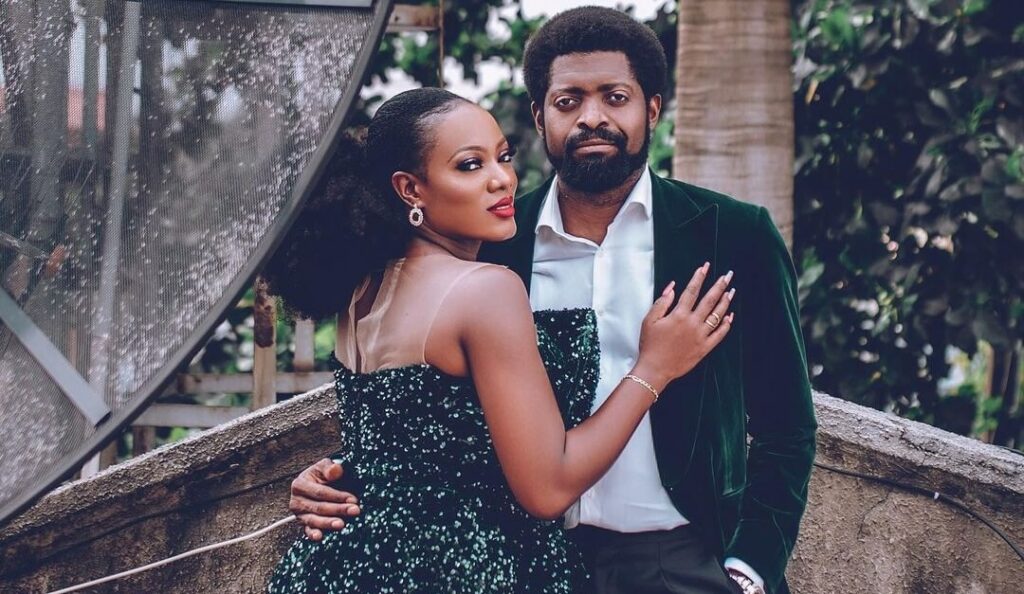Divorce cases are becoming increasingly popular in Nigeria, according to Barrister Sunday Onubi, an Abuja-based divorce lawyer.
This year alone, there have been a number of high-profile divorce cases here in Nigeria. Some prominent Nigerians who got divorced include; P Square’s Paul Okoye and his wife Anita Okoye, actress Funke Akindele and her husband JJC Skillz, actor Gideon Okeke and his wife, Chidera ; dancer Korra Obidi and her husband, Dr Justin Dean, and popular comedic actor Julius Agwu and his wife Ibiere.
Advertisement
Veteran comedian, Bright Okpocha, popularly known as Basketmouth was the latest to announce dissolution of his 12-year-old marriage.
Outside Nigeria, celebrities such as professional football player Tom Brady and his wife, model Gisele, actress Tia Mowry and her husband Cory Hardrict, musician Shakira and her husband, footballer Gerarad Pique, also ended their marriages this year.
These divorces were undertaken for different reasons with one or both spouses seeking to part ways.
Barrister Sunday Onubi, a divorce lawyer with over 12 years experience, told THE WHISTLER that divorce cases could be costly depending on how complicated it is.
Advertisement
Onubi explained that in divorce cases where both parties have agreed to end the marriage, there can still be issues that would result in the divorce case being complicated and contentious. And the more contentious a divorce case, the more expensive it tends to be.

Divorce Cases On The Rise
According to Onubi, divorce cases in Nigeria have risen in the last few years and is more common among younger couples.
“I would say it (divorce) is more prominent in the last six to seven years from my experience and what I’ve seen in court while practicing law for 12 years. Divorce cases are much more prominent these days than they were before and I think its even more prominent among younger couples than older ones.
Advertisement
“I think the shortest marriage I’ve handled was 6 months and the longest was about 17 to 18 years. I remember at the time I was first briefed the couple had a child in the university and another was just about to enter the university,” he said.

Speaking on some reasons given for divorce, Onubi said he has heard some gruesome stories while others were just sad and heartbreaking.
“I’ve had cases where the woman could say things like, ‘I can’t live with him anymore because he organizes sex parties in the house’ and then the respondent (the husband) would come and say ‘It’s a lie, she is a lesbian or she’s bisexual’. Or other instances where the woman would explain the kind of sex acts the man performs on her which, to her, are occultic. By the time she’s even explaining it, she can’t hold herself anymore, she’s already sobbing.
“There’s a funny one I remember where the man said he just didn’t like her anymore after three years of marriage, while the wife was seated right opposite him in front of me. Then she said that it wasn’t true and he still liked her but the problem was that in his office there’s a woman with a big bum who he is now attracted to,” he said.
He explained that while some reasons might seem more trivial than others, none of them could be taken lightly because divorce is almost always a sensitive issue.
Advertisement
“Funnily enough, some of these issues may sound more trivial than others but they are very sensitive. Like in this last case I mentioned, the man was very serious while saying it, and it was painful for the woman to hear because he was saying it in her presence. And she said when they first got married she looked the same way she looks now but because of the other woman he’s attracted to, he’s saying he no longer likes her,” he said.
He added that if the woman in the above instance were his client he would advise her to give the man the divorce for her piece of mind and for that of her children.

“Even though the woman didn’t want the divorce, like I said earlier I would first of all try to see if they could work through the differences but if they were unable to I would advise her to give him the divorce for her peace of mind and to keep her kids, the children in the case were just very young, just 3 and 1 year old,” he said.
He added that over his career, he had represented more women in divorce proceedings than men but that this was not for any particular reason.
How To Get A Divorce
Onubi also explained the process of filing for divorce, saying, “Usually when I get a brief for the dissolution of a marriage, I always take it seriously but candidly so what I do first is see if its possible for the couple to resolve their differences amicably. If it’s not an amicable dissolution, I always encourage them to try to resolving it privately first, whether as a petitioner or as a respondent.
“If after exploring that, I see that there’s no way forward for the couple together especially where there’s a threat to any person involved, I would always advise that they go to court immediately. From there we make the filings, gather the evidence and then, proceed to get the parties separated.”
He revealed that the fact that both parties in a marriage want divorce does not mean that the process will be amicable as other issues pertaining to the dissolution of the marriage could cause it to become contentious.
He said, “First, its always difficult to say a divorce is amicable because the fact that the respondent doesn’t want to contest the proceedings, doesn’t necessarily mean that its an amicable divorce. There are situations where the other party may not want to oppose the divorce but they want sole custody of the children, or the petitioner doesn’t want the other person to have any input into the welfare of the children. That is one aspect, another is the person may want maintenance, that is spousal support, every month or every year and the other party may not agree to that, even though they want the divorce.
“There may be properties involved as well. You might have acquired property with your spouse in your joint name, i.e. Mr & Mrs Whoever own so and so property. So while the person is open to divorce, they could be unwilling to share the property because one party might feel they made the lion’s share of the investment involved in acquiring the said property. Then they suggest let’s split it 70-30 or 60-40, whereas the other party wants it split 80-20.
“So in these instances, the divorce is amicable in that both parties want it, but then all these other contesting factors are now involved.”
Speaking on the cost of retaining him as a lawyer for a divorce proceeding, Onubi said it would depend on a number of factors, such as how contentious the issues involved are as well as the location of the court where the clients want the case to be filed.
“Now with regards to how I would charge, I would have to consider all these and then the location of the court. I’ve had proceedings where the parties might be based in Abuja, but because they are prominent persons whose names would generate interest if discovered, they would rather have the matter filed in Ekiti because people there will not know them. In these instances, the client will also bear the cost of my accomodation, logistics and all that. These are some of the variables I consider before charging clients.
“So if the filing is in Abuja, its not contested and if the issues involved; that is maintenance, property, custody of the children; are not that complicated, then I’d look at the financial capability of the client. So with these same factors, I’ve had cases where I charged N6 million and then I’ve had other cases where I charged as little as N2 million.
“I’ve also done divorce cases where I spent my own money to handle it, those are called pro-bono cases. For people who cannot afford it at all where the divorce is a matter of urgency.”
He however said N6 million is not the maximum charge for a divorce proceeding. Speaking further on how charges are determined, he said:
“I would first assess the client financially, if it’s someone who is financially well off, and the case is that contentious, I wouldn’t go below 10 million. The reason is that the facts at your disposal when you’re briefed are usually going to be different when you get to court. For example, my client tells me ‘I have 3 kids ages 10, 15 and 21, I don’t have a problem with where the 21- year- old wants to stay but the other two are minors and I want them with me’. Then the respondent, that is the other spouse, could file a cross petition saying, ‘I agree that I want a divorce, but she is saying she wants a divorce because I’ve been cruel to her and she can no longer take it, but I want the divorce on the grounds that she’s an adulterer and has been unfaithful to me.’

“So with these factors, I am going to be presenting my client’s petition and also defending a cross-petition, these are now two cases and as such, the price will go up. Another thing is my client and I can’t even know this or factor it into the bill until we go to court, file the petition and hear the cross-petition.”
“So, there’s that possibility to review cost. But I have to look at the facts, first things first, the divorce in itself is not contested so that’s one less thing to worry about. Then this allegation of infidelity, is it true? Can you defend it? If the other party has concrete evidence, like photos and videos of my client with a lover, then I would have more work to do defence-wise.
“So, all these would determine whether or not I would review my fees. If my client is not going to deny the allegations of infidelity then that makes my job easier but if its going to be contentious through and through, I may need to review my price.”
For clients who are of average financial status where the divorce case is non-contentious, he said he would review his charges.
“In a non-contentious proceeding with a client that is neither destitute nor extremely wealthy, let’s assume they are a civil servant, they should be able to afford a minimum of 2 to 2.5 million. They won’t have to pay the money at once, there’s a 60% deposit first and then the balance comes just before the judgement is delivered,” he said.
Speaking further on charges, Onubi said, “For my practice, once I’ve been briefed and you’ve perfected the brief by paying whatever advance is requested of you, I don’t come back requesting for appearance fees or money to print or file processes or anything like that. Once you’ve paid, you’ve paid until I ask for my balance before judgement, that’s my standard. Mind you the filing processes are expensive and everything we file has to be printed on paper and then we have to mobilize the bailiffs and all that. So when I present a bill to the client, I’ve factored in all of these things already.”
According to him, charging his clients in that manner is inundating and for him it is a matter of what appears most practicable which is to just charge upfront and then discharge his duties professionally.
Appealing Divorce
Onubi explained that there are three stages of court with regards to matrimonial cases, the High Court, the Appeal Court and the Supreme Court. He added that if the judge were to rule against his client and they wish to appeal the case, there would be a new fee to pay.
“There are three levels of court with respect to matrimonial proceedings; the High Court, the Court of Appeal and the Supreme Court. If my client, as a petitioner, gets a judgement that is not in their favour and they decide to appeal the judgement, you don’t expect me to still defend that appeal with the money I’ve taken from you because that’s a new file and a new court..
“So to take the case to an appeal court, we would need to produce many documents, they are called Records of Appeal, Volume 1 and 2, in 21 places. You can imagine how much it would cost to produce 21 of those,” he said.
He explained that appeal cases are much more expensive and the amount he would charge is dependent on whether his client is the appellant or the respondent.
“First, an appeal case is much more expensive. My bill would depend on whether I’m the appelant, that is if it’s my client who lost the case and I’m taking it to the court of Appeal, or if I’m the respondent. If I’m the appellant, I would give my client the option of paying for the production of the documents by themselves at the Registry of the court, and then paying for my services; or they could pay me altogether for my services and the documents,” he said.
He added that irrespective of financial status however, for a case which will be heard in Abuja the minimum amount he could charge for an appeal case is N5 million.
“Considering all these however, if the case will be heard in the Court of Appeal here in Abuja, the minimum amount I would charge, irrespective of who you are, is 5 million for an appeal case. That’s my standard, and I’ve never lost a matrimonial case in 12 years of practice.
“If I’m the respondent; i.e if my client won the case but the other party took it to the court of appeal, I would charge still a minimum of N5 million because the work is the same. The only difference is that its the other party’s responsibility to produce and compile the Records of Appeal,” he said.
Divorce Case May Get To Supreme Court
Onubi explained that some divorce proceeding can go all the way to the Supreme Court, adding however that those that do are almost always over property.
“I always try to consider the fact that no one ever really pursues divorce happily. It’s not like a contract and its not all about the money, and for a client to be willing to take it this far, you know that they really want something, either custody of children or sharing of property or whatever the case may be.
“However generally, cases that go this far are usually over property, because for custody issues, by the time you appeal the children would have already reached the age of maturity before you get to the Supreme court and after that it’s their choice where they decide to live, and the appeal becomes academic. If the couple is fighting over a 10- year- old for example, by the time you get to the appeal court, the child could be 19,” he said.
He went further to explain how he would charge a client taking divorce case to the Supreme court and the factors that would affect the cost.
He said, “For the Supreme Court, the Records would have increased in size because we need to add records of the proceedings at the appeal court and produce that for 14 people, so that would be more expensive for the client. Here, my bill would be N5-7 million minimum, depending on the financial capability of the client.
“If I see what the matter means to you and the cost of the property involved, for example a client fighting to get a 2 hectare property in Central Area will do whatever it takes to get it. I could charge such a person N20 million. But if my client is fighting to get maybe a 2 bedroom property in Kubwa, I obviously can’t charge that high.
“There are also cases where the client may just not be able to afford it, like if the other party in the divorce is just dragging out the process because they know my client isn’t as financially capable as they are, there are always considerations for that because we are all human. If such a person can afford 2 million, I would take it.”



